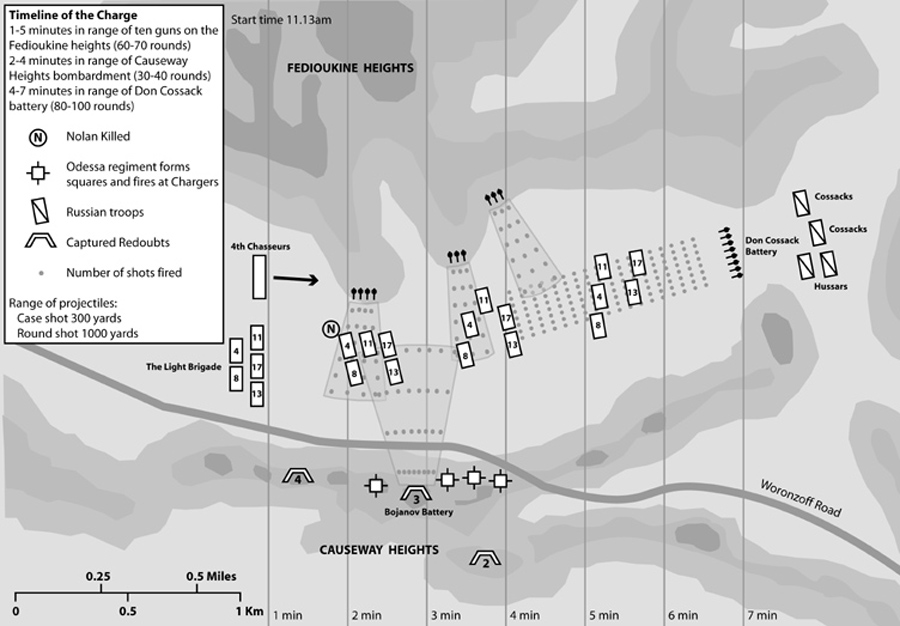“Forward, the Light Brigade!”
Alfred, Lord Tennyson (1854)
Was there a man dismayed?
Not though the soldier knew
Someone had blundered.
Etched into the British consciousness by Tennyson’s poem, the Charge of the Light Brigade was a massive charge of British cavalry against heavily defended and entrenched Russian troops during the battle of Balaclava in 1854. It is perhaps the most well-remembered event of the Crimean War, that continued from 1853 to 1856.
This charge was considered a suicidal attack and indeed the charge was repulsed with heavy losses on the British side. Tennyson’s poem was published just six weeks after the event, and captures the trauma felt by the British public at the horrific defeat.
The charge has fascinated historians, many of whom are trying to pick apart the seemingly suicidal decision to see if there was any tactical sense to the maneuver. Rather than the military mistake it is commonly seen as, is there some rationale to be found in the attempt, however futile it ultimately was?
Suicidal Bravery
Certainly the order must have seemed suicidal to the 600 cavalrymen who rode for a mile or longer into what became known as the Valley of Death. The order came down for the Light Brigade, cavalry optimized for mobility and flexibility, to advance and charge the Russian fortifications head on.
Lord Cardigan, the field commander with the cavalry, asked if anyone was discouraged or afraid before sending them into the attack. To a man, they responded “NO!” but everyone knew that this charge was a grave mistake and could end up with everyone’s death.
- Taken by the Ice: What Became of the Franklin Expedition Crew?
- Faces of War: How the Tin Noses Shop Helped Disfigured Soldiers
When the cavalry charged, they faced cannon fire on three sides and had no cover to protect them. The cavalry charged forwards and up the valley, straight at the main Russian guns, sustaining heavy losses in the process.

Amazingly, the cavalry managed to reach the emplacements, breaking through the Russian line of defense and overrunning some of the guns. However these gains were short lived as the Russians regrouped and the British were forced to retreat.
Ultimately, although rebranded as a tale of nobility and patriotism by Tennyson, the attack was a tactical disaster. No gains were made by the British and the Light Brigade was decimated, with more than a third of their number killed or wounded.
Duty and Sacrifice
The cavalry’s charge was doomed right from the beginning, as must have been clear to the field commanders. The Light Brigade was not equipped for such a frontal assault, armed only with swords and ineffective armor against the distant guns, over a mile (1.6km) away.
Even though they technically won the battle and defeated the Russians, the cost of this win was the life of many soldiers. It was clearly a misuse of the Light Brigade and the situation was not so desperate as to demand such a sacrifice.
But was this the viewpoint of the overall commanders at the Battle of Balaclava? Military communications at the time could easily lead to confusion, and their assessment of the situation may have led them to consider such a frontal attack as worth the risk.
A Mistake of Communication
Ultimately, communications do seem to have caused the losses, but the mistake was one of interpretation, not tactical understanding. The Earl of Lucan, overall cavalry commander on the battlefield, received an order from the army commander Lord Raglan to “try to prevent the enemy carrying away the guns.”
Lord Raglan had a high vantage point and could see the entire battlefield, including Russian attempts to remove guns in some areas. It was these patches of retreating Russians that he wanted the Light Brigade, well suited to the task, to overrun.
The Earl of Lucan however could not see the retreating Russians, only a heavily reinforced Russian position much further away down the valley. When Lucan asked the messenger, Captain Nolan, for clarification, he indicated with his arm that the order was to apply to all the Russian guns.

Nolan himself was killed in the battle, and so the reason for this miscommunication is unclear. It may be that the order as drafted had left him confused, or that he had become disoriented in riding from Raglan’s position to Lucan.
Whose Blunder?
So, a blunder then, as the poem states. But even Tennyson, writing so soon after the fact, could not single out who was responsible. Raglan was clear in what he intended, but the order as drafted did not contain all the necessary detail. Nolan did not offer the necessary clarification, and Lucan did not ask for it.
In the shambles of the defeat, what remains and comes down to us is the heroism of the individual soldier, as immortalized by Tennyson. The poem became a clarion call for the high Victorian ideals of duty, sacrifice and patriotism.
But, in this catastrophe with no purpose, there is an ominous foreshadowing of the mindless treatment of soldiers by their generals, which would be realized in full horror on the muddy fields of the First World War. Here, as later, we see the carelessness with the lives of “lions led by donkeys.”
Top Image: The Charge of the Light Brigade. Source: Thomas Jones Barker / Public Domain.
By Bipin Dimri